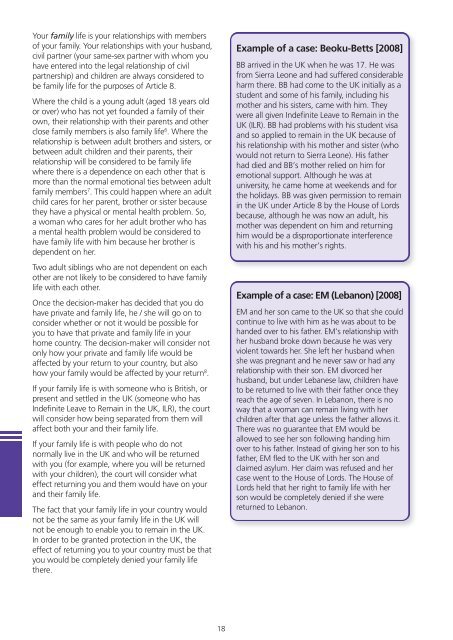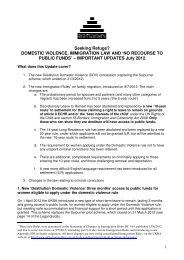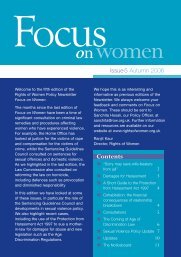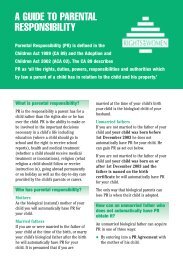Seeking Refuge? - Rights of Women
Seeking Refuge? - Rights of Women
Seeking Refuge? - Rights of Women
Create successful ePaper yourself
Turn your PDF publications into a flip-book with our unique Google optimized e-Paper software.
Your family life is your relationships with members<br />
<strong>of</strong> your family. Your relationships with your husband,<br />
civil partner (your same-sex partner with whom you<br />
have entered into the legal relationship <strong>of</strong> civil<br />
partnership) and children are always considered to<br />
be family life for the purposes <strong>of</strong> Article 8.<br />
Where the child is a young adult (aged 18 years old<br />
or over) who has not yet founded a family <strong>of</strong> their<br />
own, their relationship with their parents and other<br />
close family members is also family life 6 . Where the<br />
relationship is between adult brothers and sisters, or<br />
between adult children and their parents, their<br />
relationship will be considered to be family life<br />
where there is a dependence on each other that is<br />
more than the normal emotional ties between adult<br />
family members 7 . This could happen where an adult<br />
child cares for her parent, brother or sister because<br />
they have a physical or mental health problem. So,<br />
a woman who cares for her adult brother who has<br />
a mental health problem would be considered to<br />
have family life with him because her brother is<br />
dependent on her.<br />
Two adult siblings who are not dependent on each<br />
other are not likely to be considered to have family<br />
life with each other.<br />
Once the decision-maker has decided that you do<br />
have private and family life, he / she will go on to<br />
consider whether or not it would be possible for<br />
you to have that private and family life in your<br />
home country. The decision-maker will consider not<br />
only how your private and family life would be<br />
affected by your return to your country, but also<br />
how your family would be affected by your return 8 .<br />
If your family life is with someone who is British, or<br />
present and settled in the UK (someone who has<br />
Indefinite Leave to Remain in the UK, ILR), the court<br />
will consider how being separated from them will<br />
affect both your and their family life.<br />
If your family life is with people who do not<br />
normally live in the UK and who will be returned<br />
with you (for example, where you will be returned<br />
with your children), the court will consider what<br />
effect returning you and them would have on your<br />
and their family life.<br />
The fact that your family life in your country would<br />
not be the same as your family life in the UK will<br />
not be enough to enable you to remain in the UK.<br />
In order to be granted protection in the UK, the<br />
effect <strong>of</strong> returning you to your country must be that<br />
you would be completely denied your family life<br />
there.<br />
Example <strong>of</strong> a case: Beoku-Betts [2008]<br />
BB arrived in the UK when he was 17. He was<br />
from Sierra Leone and had suffered considerable<br />
harm there. BB had come to the UK initially as a<br />
student and some <strong>of</strong> his family, including his<br />
mother and his sisters, came with him. They<br />
were all given Indefinite Leave to Remain in the<br />
UK (ILR). BB had problems with his student visa<br />
and so applied to remain in the UK because <strong>of</strong><br />
his relationship with his mother and sister (who<br />
would not return to Sierra Leone). His father<br />
had died and BB’s mother relied on him for<br />
emotional support. Although he was at<br />
university, he came home at weekends and for<br />
the holidays. BB was given permission to remain<br />
in the UK under Article 8 by the House <strong>of</strong> Lords<br />
because, although he was now an adult, his<br />
mother was dependent on him and returning<br />
him would be a disproportionate interference<br />
with his and his mother’s rights.<br />
Example <strong>of</strong> a case: EM (Lebanon) [2008]<br />
EM and her son came to the UK so that she could<br />
continue to live with him as he was about to be<br />
handed over to his father. EM’s relationship with<br />
her husband broke down because he was very<br />
violent towards her. She left her husband when<br />
she was pregnant and he never saw or had any<br />
relationship with their son. EM divorced her<br />
husband, but under Lebanese law, children have<br />
to be returned to live with their father once they<br />
reach the age <strong>of</strong> seven. In Lebanon, there is no<br />
way that a woman can remain living with her<br />
children after that age unless the father allows it.<br />
There was no guarantee that EM would be<br />
allowed to see her son following handing him<br />
over to his father. Instead <strong>of</strong> giving her son to his<br />
father, EM fled to the UK with her son and<br />
claimed asylum. Her claim was refused and her<br />
case went to the House <strong>of</strong> Lords. The House <strong>of</strong><br />
Lords held that her right to family life with her<br />
son would be completely denied if she were<br />
returned to Lebanon.<br />
18
















